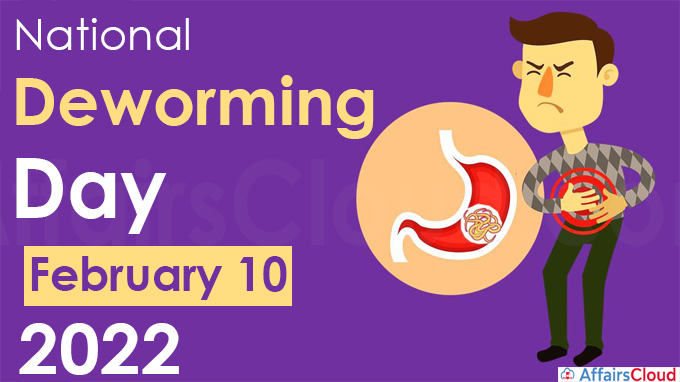 National Deworming Day (NDD) is annually observed across India on 10th February with an aim to eradicate intestinal worms also referred to as Soil-Transmitted Helminths (STH), among children of age 1-19 years.
National Deworming Day (NDD) is annually observed across India on 10th February with an aim to eradicate intestinal worms also referred to as Soil-Transmitted Helminths (STH), among children of age 1-19 years.
- The NDD is a Bi-annual round of deworming. Annually the 10th February and 10th August are observed as the National Deworming Day (NDD).
- The 1st round of NDD is conducted in February and the 2nd round of NDD is conducted in August.
Background:
i.The NDD is a Biannual initiative of the Ministry of Health and Family Welfare(MoHFW), Government of India that aims to ensure that every child in India is worm-free.
ii.In February 2015, the MoHFW launched the NDD as a part of the National Health Mission(NHM) in 11 states/UT (union territories): Assam, Bihar, Chhattisgarh, Dadra and Nagar Haveli, Haryana, Karnataka, Maharashtra, Madhya Pradesh, Rajasthan, Tamil Nadu, and Tripura.
- The first round of NDD was conducted in February 2015.
Stakeholders of NDD:
i.MoHFW is the nodal agency for providing all States and UTs with operational guidelines related to NDD implementation at all levels.
ii.The programme of NDD is implemented through the efforts of the Department of School Education and Literacy under the Ministry of Human Resource and Development, Ministry of Women and Child Development and Ministry of Drinking Water and Sanitation.
Intestinal Worms Or Soil-Transmitted Helminths (STH):
i.Soil-transmitted helminth (STH) infections are among the most common infections worldwide and affect the poorest and most deprived communities.
ii.Intestinal worms are parasites that live in the human intestines and consume the nutrients and vitamins that a child consumes.
Key Points:
i.As per 2015, around 241 million children are at risk of parasitic worm infections, India has the highest burden of STH in the world between the age 1 and 14 years .
ii.In 2016, the World Health Organisation (WHO) estimated that more than 836 million children across the globe are at risk of this parasitic worm infection.
iii.Almost 7 in 10 children in the 6-59 months age-group in India are anaemic, with even higher rates of anaemia in rural areas.




